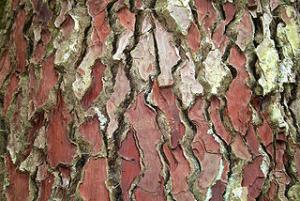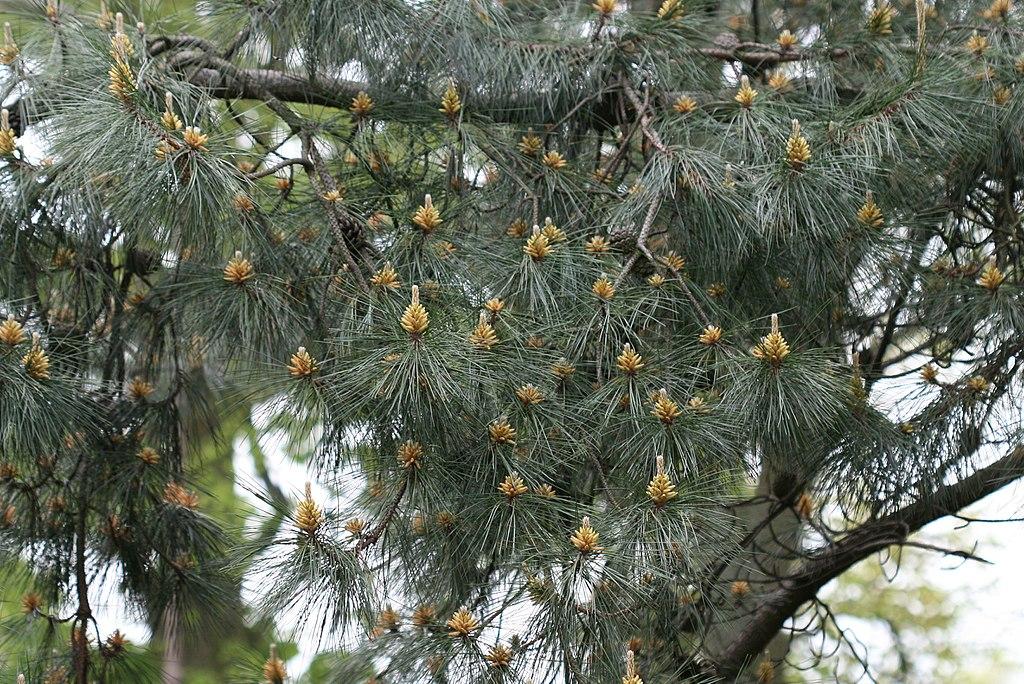Pine bark extract may protect the skin from UV damage and improve its appearance, but more research is needed.

- Antioxidant activity. Pine bark extract has powerful antioxidant effects which can reduce the oxidative stress involved in skin aging.
- Anti-inflammatory activity. Pine bark extract can reduce inflammation, improving inflammatory skin conditions such as psoriasis.
- Boosting collagen. Several studies have shown that pine bark can increase the levels of vital skin compounds such as collagen.
Overview
Pine bark extract is a supplement ingredient made from the bark of pine trees. This extract contains potent antioxidant compounds called procyanidins and other ingredients. Pine bark extract has a wide variety of uses, and has been suggested to aid overall health and fight aging through:
- Antioxidant activity (oxidative stress is one of the main proposed causes of aging)
- Anti-inflammatory activity
- Dilating blood vessels
- Boosting collagen and hyaluronic acid production, two compounds essential to skin health
Produced from French maritime pine (Pinus pinaster), Pycnogenol is the most widely-recognized and used brand of pine bark extract. Pycnogenol is used as an ingredient in over 700 different supplements and has been the subject of over 400 research studies, including those looking at skin health.
Some people use pine bark extract topically and orally to help maintain healthy, youthful-looking skin. So far, research indicates that pine bark extract may protect the skin from UV radiation damage and improve its overall appearance.

Foods High in Procyanidins | |
| Food | Total PAs (mg per 100 g) |
| Red kidney beans | 564 mg |
| Cranberries | 418 mg |
| Chokeberries | 664 mg |
| Black plums | 238 mg |
| Strawberries | 145 mg |
| Black currant | 148 mg |
| Grape seed | 3532 mg |
| Hazelnuts | 501 mg |
| Cinnamon | 8108 mg |
| Apples (red delicious) | 126 mg |
How Pine Bark Extract Might Help With Skin Health
Antioxidant activity
The main active ingredients in pine bark extract are potent antioxidants called procyanidins (also known as proanthocyanidins). These compounds can reduce oxidative stress caused by reactive oxygen species (ROS). 2 Oxidative stress plays an important role in natural and particularly sun-induced skin aging. 3
Anti-inflammatory activity
Pine bark extract has been demonstrated to reduce inflammation. For example, one study found that applying pine bark extract to isolated human skin (keratinocyte) cells suppressed the activity of intercellular adhesion molecule-1 (ICAM-1), a molecule which drives inflammation in the skin, 4 while another study demonstrated suppression of NF-κB – a major inflammatory pathway.5 These effects can be helpful for inflammatory skin issues such as psoriasis and atopic dermatitis (eczema).
Boosting collagen and other skin compounds
Pine bark extract may also be able to increase the levels of collagen and hyaluronic acid in the skin. These compounds play a key role in skin health and appearance, and are often supplemented in their own right. For example, one study found that pine bark extract reduced the activity of matrix metalloproteinases (MMPs) – enzymes that break down collagen and other structural components of the skin. 6
Pine Bark Extract Popular Uses & Benefits for the Skin
Pine bark extract is a popular skin health supplement, and is also sometimes used in creams, sunscreen, and other topical products. It is taken to help with a variety of skin concerns, including uneven skin tone, age spots, eczema, rashes, hyperpigmentation (melasma), roughness, dryness, and to protect the skin from ultraviolet radiation, acting similar to sunscreen.
Clinical research supports these uses. These is a good deal of evidence for the photoprotective benefits of pine bark extract, and some studies have also found that it reduces hyperpigmentation and improves overall skin elasticity and hydration.
Indeed, according to a recent review of on the effects of pine bark extract Pycnogenol, “the existing data provide compelling evidence that Pycnogenol® intake does not only provide photoprotection, but may be used to (i) reduce hyperpigmentation of human skin and (ii) improve skin barrier function and extracellular matrix homeostasis.” 7
Having said that, further research is needed to confirm and further explore the skin health benefits of pine bark extract.

Research
Animal Research
Topical Pycnogenol cream (0.05-0.2%) appears to protect mouse skin against UV radiation and sunburn
This animal study evaluated the ability of pine bark extract Pycnogenol to protect the skin against solar UV light. Hairless mice were treated with lotion containing Pycnogenol (0.05-0.2%) after their skin was exposed to UV radiation. The lotion reduced the production of sunburn.
- The researchers concluded that “Pycnogenol…appears to have potential in providing photoprotection for humans in a complementary role with sunscreens…” 8
Human Research
Human studies of pine bark extract demonstrate protection against ultraviolet light (photoprotection) and improved skin health and appearance.
Pine bark extract Pycnogenol supplementation may improve skin hydration and elasticity
This study evaluated the skin benefits of patented pine bark extract Pycnogenol. Twenty postmenopausal women were given Pycnogenol daily for 12 weeks, and had their skin examined before and after supplementation. The treatment resulted in improved skin hydration and elasticity, particularly in women with dry skin. In addition, these improvements were accompanied by increased production of hyalyronic acid and collagen – two substances involved in skin health.
- The researchers concluded that “This study provides skin-physiological and for the first time molecular evidence that Pycnogenol supplementation benefits human skin by increasing skin hydration and skin elasticity.” 9
Pine bark extract Flavangenol supplementation (40-100 mg) may improve sun-damaged skin
This study looked at the effects of Flavangenol, a branded French maritime pine bark extract (PBE), on photo (sun) damaged skin. A total of 112 women with mild to moderate skin photaging took 100 mg or 40 mg of PBE daily for 12 weeks. The supplementation improved scores of skin photoaging, with clinical improvements such as reduced age spot pigmentation.
- The researchers concluded that “Clinically significant improvement in photodamaged skin could be achieved with PBE. Our findings confirm the efficacy and safety of PBE.” 10
Pycnogenol supplementation (75 mg) may improve melasma
This study evaluated the efficacy of Pycnogenol in improving melasma (skin hyperpigmentation caused by the sun). Thirty women took Pycnogenol tablets (25 mg 3 times daily) for 30 days, and had their melasma examined before and after supplementation. The treatment decreased average melasma area and pigmentation intensity. In addition to this, they experienced a reduction in fatigue, constipation, body pains, and anxiety.
- The researchers concluded that “Pycnogenol was shown to be therapeutically effective and safe in patients suffering from melasma.” 11
Pycnogenol supplementation (1.1-1.66 mg/kg) may protect the skin against UV light
In this study, 21 people were given Pycnogenol (1.1 mg/kg of body weight for 4 weeks, 1.66 mg for 4 more) to examine its protection against solar UV light. The supplementation increased the UV radiation levels needed to produce erythema (skin reddening), demonstrating that pine bark extract protects the skin against UV radiation. This effect may be explained by Pycnogenol reducing the activation of the NF-kappaB inflammatory pathway.
- The researchers concluded that “These data indicate that oral supplementation of PBE reduces erythema in the skin.” 12
Dosage for Skin
- Clinical studies typically use 50-100 mg dosages of pine bark extract
- Standalone pine bark extract supplements typically provide 100-240 mg dosages
- Multi-ingredient skin supplements provide 50-150 mg pine bark extract dosages
Available Forms
- Pine bark extract is most commonly taken in the form of supplement capsules, but can also be used as an ingredient in topical products (creams, gels, etc.)
- Pine bark extract. Standard pine bark extract made from certain pine trees, such as the Chinese red pine or Masson pine.
- Pycnogenol®. This branded, patented French maritime pine bark extract is the most popular pine bark supplement. Pycnogenol is backed by hundreds of studies, including those showing skin benefits.
Supplements in Review Recommendation
- Pine bark extract, 40-100 mg, as Pycnogenol.
We recommend pine bark extract for skin health. Research suggests that oral pine bark extracts can protect the skin from UV damage and improve its overall appearance. However, we’d like to see more clinical research before a conclusive recommendation.
We recommend taking a Pycnogenol supplement. We recommend using an oral Pycnogenol supplement at dosages of 40-100 mg because most of the research is based on this branded extract. However, generic extracts should work as well.
Leave a Reply